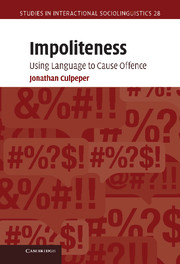Book contents
- Frontmatter
- Contents
- List of figures and tables
- Preface
- Introducing impoliteness
- 1 Understanding impoliteness I: Face and social norms
- 2 Understanding impoliteness II: Intentionality and emotions
- 3 Impoliteness metadiscourse
- 4 Conventionalised formulaic impoliteness and its intensification
- 5 Non-conventionalised impoliteness: Implicational impoliteness
- 6 Impoliteness events: Co-texts and contexts
- 7 Impoliteness events: Functions
- 8 Conclusions
- Notes
- References
- Index
8 - Conclusions
Published online by Cambridge University Press: 16 May 2011
- Frontmatter
- Contents
- List of figures and tables
- Preface
- Introducing impoliteness
- 1 Understanding impoliteness I: Face and social norms
- 2 Understanding impoliteness II: Intentionality and emotions
- 3 Impoliteness metadiscourse
- 4 Conventionalised formulaic impoliteness and its intensification
- 5 Non-conventionalised impoliteness: Implicational impoliteness
- 6 Impoliteness events: Co-texts and contexts
- 7 Impoliteness events: Functions
- 8 Conclusions
- Notes
- References
- Index
Summary
Let us now revisit and extend the notion of impoliteness given in Section 2.1 thus:
Impoliteness is a negative attitude towards specific behaviours occurring in specific contexts. It is sustained by expectations, desires and/or beliefs about social organisation, including, in particular, how one person's or a group's identities are mediated by others in interaction. Situated behaviours are viewed negatively – considered ‘impolite’ – when they conflict with how one expects them to be, how one wants them to be and/or how one thinks they ought to be. Such behaviours always have or are presumed to have emotional consequences for at least one participant, that is, they cause or are presumed to cause offence. The degree of offence, and also the quality of offence (the specific negatively valenced emotion experienced), depends in particular on the following factors (some of which overlap):
Attitudinal factors
• which (and the extent to which) expectations, desires and/or beliefs infringed are cognitively active;
• the emotional sensitivity of the expectations, desires and/or beliefs infringed;
Linguistic-pragmatic factors
• the degree of offence conventionally associated with any linguistic formula used;
• the amount and kind of intensifying linguistic work undertaken (the choice of intense lexis, the addition of taboo words or intensifiers, prosodic reinforcement, etc.);
• the amount of inferential work required to understand the behaviour in context;
• the way in which and the extent to which the behaviour matches or mismatches: (1) the other parts of the multimodal behaviour, or (2) the context;
- Type
- Chapter
- Information
- ImpolitenessUsing Language to Cause Offence, pp. 254 - 258Publisher: Cambridge University PressPrint publication year: 2011

